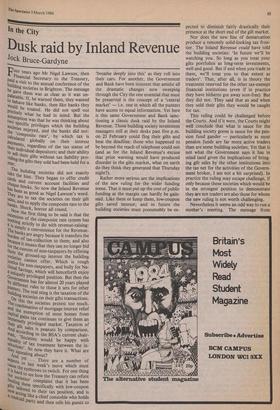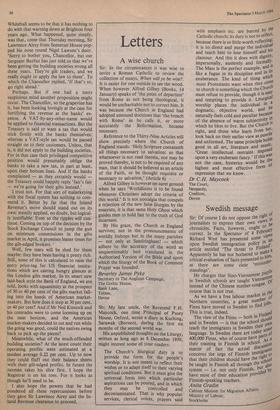hi the City
Dusk raid by Inland Revenue
Jock Bruce-Gardyne
Four Years ago Mr Nigel Lawson, then
Financial Secretary to the Treasury, Pa?d a visit to the annual conference of the building societies in Brighton. The message he gave them was as clear as it was un- Palatable. If, he warned them, they wanted to
behave like banks, then like banks they would be treated. He did not spell out Precisely what he had in mind. But the assumption was that he was thinking about two specific privileges which the building societies enjoyed, and the banks did not: the composite rate', by which tax is calculated globally on their interest Payments, regardless of the tax status of their individual depositors; and their ability to sell their gilts without tax liability pro- Yng the gilts they sold had been held for a Yea dir, The building societies did not exactly take the hint. They began to offer credit cards and current account facilities and ha books. So now the Inland Revenue 'las been as good as Nigel Lawson's word. They are to tax the societies on their gilt `lles, a nd to apply the composite rate to the banks. Shock, horror all round. ex low the first thing to be said is that the tension of the composite rate system has int°,thing strictly to do with revenue-raising: is simply a convenience for the Revenue. Ce banks are angry because it transfers the bleirden of tax-collection to them; and also pi' cause it means that they can no longer bid ! the custom of non-taxpayers by offering then) the grossed-up interest the building s,ocieties cannot offer. Which is rough Jjistice for non-taxpayers, and bully for Na- at°11al Savings, which will henceforth enjoy G„11„niuelY privileged position. But then the vverninent has for almost 20 years played by different rules to those it sets for other 11),,u.h,t,ens. The real sting is the taxation of the "f,ituing societies on their gilts transactions. 1,Lun this the societies protest too much. :11! combination of mortgage interest relief ‘Lin the exemption of most homes from
caPitai . gains tax continues to give them an
their privileged market. Taxation of Auleir nit. ti sales is peanuts by comparison. .7 according to the BSA's current chair e alto Societies would be happy with sq alitY of tax treatment between the in- theutns,
. So now they have it. What are And squealing about?
"Ind Yet.... There are a number of Peet to last week's move which must italltske the eyebrows to twitch. For one thing the 'lard to see how the Treasury can refute fisocieties' complaint that it has been gjitsing them specifically with low-coupon now tailored to their tax position, and is a acting like a chief constable who holds cocktail
Party and then tells his guests to `breathe deeply into this' as they roll into their cars. For another, the Government and Bank have been insistent that amidst all the dramatic changes now sweeping through the City the one essential that must be preserved is the concept of a 'central market' — i.e. one in which all the punters have access to equal information. Yet here is this same Government and Bank sanc- tioning a classic dusk raid by the Inland Revenue. Those building society investment managers still at their desks past five p.m. on 23 February could flog their gilts and beat the deadline: those who happened to be beyond the reach of telephone could not (and as for the Inland Revenue's excuse that prior warning would have produced disorder in the gilts market, what on earth do they think they generated that Thursday night?).
Rather more serious are the implications of the new ruling for the wider funding scene. That it must put up the cost of public funding at the margin can hardly be gain- said. Like them or lump them, low-coupon gilts saved interest; and in future the building societies must presumably be ex- pected to diminish fairly drastically their presence at the short end of the gilt market.
Nor does the new line of demarcation produce a remotely solid-looking tax fron- tier. The Inland Revenue could have told the building societies: 'In future we'll be watching you. So long as you treat your gilts portfolios as long-term investments, well and good. But if and when you trade in them, we'll treat you to that extent as traders'. That, after all, is in theory the treatment reserved for the other tax-exempt financial institutions (even if in practice they have hitherto got away scot-free). But they did not. They said that as and when they sold their gilts they would be caught for tax.
This ruling could be challenged before the Courts. And if it were, the Courts might well conclude that what is sauce for the building society goose is sauce for the pen- sion fund gander — particularly as most pension funds are far more active traders than are some building societies. Yet that is not what the Government says it has in mind (and given the implications of bring- ing gilt sales by the other institutions into the tax net for the activities of the Govern- ment broker, I am not a bit surprised). In practice the ruling may escape challenge, if only because those societies which would be in the strongest position to demonstrate they are not traders are also those for whom the new ruling is not worth challenging.
Nevertheless it seems an odd way to run a mother's meeting. The message from Whitehall seems to be that it has nothing to do with that warning down at Brighton four years ago. What happened, quite simply, was that, come that Thursday morning, Sir Lawrence Airey from Somerset House pop- ped his nose round Nigel Lawson's door. 'Sorry to bother you, Chancellor, but our Sergeant Buzfuz has just told us that we've been getting the building societies wrong all these years. They're gilt traders, and we really ought to apply the law to them'. To which the Chancellor replied, 'If that's so, go right ahead.'
Perhaps. But if one had a nasty suspicious mind another proposition might occur. The Chancellor, so the grapevine has it, has been looking lovingly at the case for fortifying the revenue at the banks' ex- pense. A VAT-by-any-other-name would be applied to financial transactions. But the Treasury is said to want a tax that would stick firmly with the banks themselves: whereas a VAT-style tax would be passed straight on to their customers. Unless, that is, it did not apply to the building societies. For in that case their privileged competitive position would presumably oblige the banks to take a new tax, in part at least, upon their bottom lines. And if the banks complained — as they certainly would the Treasury could happily reply lair's fair — we're going for their gilts instead.'
I trust not. For that sort of malarkeying with the fiscal system has nothing to com- mend it. Better by far that the Inland. Revenue's move should stand out on its own: messily applied, no doubt, but logical- ly justifiable. Even so the ripples will con- tinue. Coming on top of the decision by the Stock Exchange Council to jump the gun on minimum commissions in the gilts market in April, it promises leaner times for the gilt-edged brokers.
Well, few tears will be shed for them maybe: they have been having it pretty rich. Still, none of this is calculated to raise the entry price-tag for US financial institu- tions which are casting hungry glances at the London gilts market. In its smart new laid-back style the Bank of England, we are told, looks with equanimity at the prospect of 30 or 4.0 per cent of the gilts market fall- ing into the hands of American market- makers. But how does it stop at 30 per cent, or 40 per cent? And if Mr Neil Kinnock and his comrades were to come looming up on the near horizon, and the American market-makers decided to cut and run while the going was good, could the natives swing back to pick up the pieces?
Meanwhile, what of the much-offended building societies? At the latest count their operating profits were estimated at a modest average 0.22 per cent. Up to now they could fluff out their balance sheets with their gilt-edged profits. In future the taxman takes his slice first. I hope the Registrar is on his toes. For it looks as though he'll need to be.
I also hope the powers that be had pondered all these repercussions before they gave Sir Lawrence Airey and the In- land Revenue clearance to proceed.











































 Previous page
Previous page